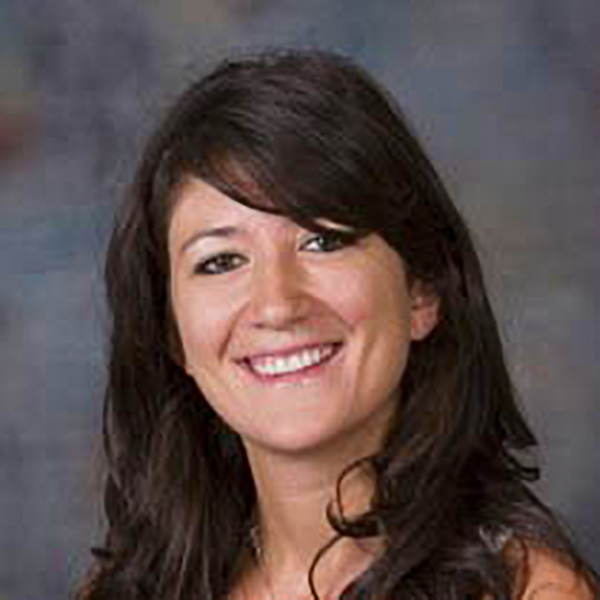Steven Barlow
Special Education and Communication Disorders
Faculty Website
Lab Website
Steven Barlow joined the Department of Special Education and Communication Disorders in 2014 as the Corwin Moore Professor after working at the University of Kansas for more than 13 years. He began his tenure as chair of the Department of Special Education and Communication Disorders in July 2021.
His research is collaborative in nature and focuses on the neurobiology of somatosensory and motor systems in premature infants. Steven developed the NTrainer System, which was approved by the Food and Drug Administration in 2008, and uses its innovative pulsed cutaneous stimulation during critical periods of development to facilitate oral feeding skills, overall brain development and long-term behavioral and learning outcomes.

Angela Dietsch
Special Education and Communication Disorders
Faculty Website
Lab Website
Dr. Dietsch and her team at the Sensorimotor Integration for Communication and Swallowing (SISC) laboratory are investigating how the movements for swallowing, voice, and speech are controlled, and how sensory input such as taste, texture, and sound may influence these movements. The inability to communicate effectively or swallow safely has devastating effects on the health and quality of life of affected individuals. Despite this, treatment options for communication and swallowing disorders (dysphagia) are limited and there is little evidence to support whether, how, or why they work, nor which types of patients might best benefit from any given intervention. Neuroimaging is an important tool in identifying and evaluating new diagnostic and therapeutic options.
One line of inquiry focuses on elucidating the brain pathways that regulate speech movements under higher versus lower effort demands, with the goal of identifying strategies to ameliorate speech deterioration associated with neurodegenerative conditions such as Parkinson’s disease.
A second set of studies assesses the effects of taste stimuli on brain activity and swallowing biomechanics to determine whether they can be used to improve swallowing movements while simultaneously enhancing brain activity in key areas related to swallowing. This will contribute to faster and more complete brain recovery (neuroplasticity) and thus swallowing recovery.

Ingrid Haas
Ingrid Haas, Ph.D., is an Associate Professor of Political Science, Resident Faculty in the Center for Brain, Biology, and Behavior, and Director of the Political Attitudes and Cognition (PAC) Lab. The PAC Lab uses functional magnetic resonance imaging (fMRI) to examine the neural underpinnings of political attitudes and behavior, and how the process of political evaluation is influenced by emotion, motivation, and social identity. Current projects are investigating the neural response to uncertainty, and how this response differs when uncertainty is attached to negative versus positive affect or emotion. Our interest is primarily focused on understanding neural regions implicated in social, affective, and evaluative processing, such as the amygdala, insula, anterior cingulate, and regions of prefrontal cortex. We are interested in how neural activation in these regions gives rise to social and political behavior and mediates the impact of emotion on political behavior.
Dr. Haas earned her doctoral degree in Social Psychology from The Ohio State University. She was trained in social cognitive and affective neuroscience in Dr. William Cunningham’s lab at Ohio State, and completed additional training in fMRI at the MGH/MIT/HMS Athinoula A. Martinos Center for Biomedical Imaging in Boston, Massachusetts.

Nicholas Hubbard
Psychology
Faculty Website
Lab Website
Dr. Hubbard is the Director of the NeuroCognitive Translation Lab and an Assistant Professor of Psychology. He joined the University of Nebraska-Lincoln in 2019, after completing an NIMH-funded fellowship at the Massachusetts Institute of Technology. Dr. Hubbard completed his Ph.D. in Cognitive Neuroscience at the University of Texas at Dallas, and his B.S. in Psychology at Michigan State University. His professional interests involve the advancement of fundamental theory and cutting-edge methods within cognitive neuroscience to better understand and predict differences in human mental abilities. He strives to accomplish this through the rigorous study of typical and abnormal, behavior and neural phenomena. He applies a broad range of behavioral, brain imaging (e.g., magnetic resonance imaging, functional near-infrared spectroscopy), and computational (e.g., machine learning, network analyses, pattern analyses) approaches to translate basic cognitive science research into practical application.

Timothy Nelson
Psychology
Faculty Website
Lab Website
Dr. Nelson received his Ph.D. in clinical child psychology from the University of Kansas in 2008 following a clinical internship at Cincinnati Children's Hospital Medical Center. He subsequently completed his post-doctoral fellowship in pediatric psychology in the Stanford University School of Medicine before joining the UNL faculty in 2009. He has served as the Associate Director of Clinical Training at UNL since 2012.
Dr. Nelson’s research interests are in pediatric psychology and pediatric health neuroscience. Specifically, his work focuses on the intersection of behavioral, biological, cognitive, social, and environmental influences on child and adolescent health behaviors and outcomes. Much of his current work examines the development of executive control (EC) from preschool through adolescence and the impacts of early EC deficits on subsequent mental and physical health outcomes. Dr. Nelson’s research especially focuses on identifying potentially modifiable factors – including individual, family, peer, school and community characteristics – that impact the development of “high impact” pediatric health behaviors (e.g., sleep, diet, physical activity, substance use) to inform developmentally-sensitive health promotion interventions. He is also interested in health disparities and understanding the mechanisms that contribute to risk and resilience for vulnerable pediatric populations. In his current work, he is pursuing these interests using a variety of data collection methodologies, including developmentally-appropriate neuropsychological tasks, actigraphy, multiple 24-hour dietary recalls, functional magnetic resonance imaging (fMRI), event-related potentials (ERP), salivary bioscience, neighborhood geocoding, ecological momentary assessment (EMA), questionnaires, and medical record reviews. Below are brief descriptions of current research projects.

Maital Neta
Psychology
Faculty Website
Lab Website
Dr. Neta is the director of the Cognitive and Affective Neuroscience Lab. She received her Ph.D. in Cognitive Neuroscience from Dartmouth College in 2010, where she was mentored by Paul Whalen. She then spent four years as a postdoctoral fellow in the Department of Neurology at Washington University, where she was mentored by Steve Petersen.
Dr. Neta is a Carl A. Happold Associate Professor in the Department of Psychology and is Associate Director of the Center for Brain, Biology, and Behavior (CB3). Her research capitalizes on a number of methods from psychology and neuroscience to examine ambiguity resolution in the domain of emotional facial expressions. Specifically, although some expressions provide clear predictive information that something good (e.g., happy) or bad (e.g., angry) will happen, other expressions, like surprise, have predicted both positive (e.g., birthday party) and negative (e.g., car accident) events for us in the past. When presented in the absence of contextual information, these ambiguously valenced expressions can be used to delineate a valence bias: ambiguous stimuli are stably interpreted negatively by some people and positively by others. We have previously demonstrated that the “initial, automatic” interpretation is negative (i.e., even for people who eventually interpret the expression as positive). Positive interpretations may then require an additional regulatory process in the brain that overrides this initial negativity — one that only some individuals adopt naturally. Interestingly, children show a stronger negativity bias than adults, which is likely attributable to weaker regulatory mechanisms in children. The goal of our research is to use state-of-the-art brain imaging and analysis techniques to advance the understanding of the biological mechanisms of the valence bias (i.e., the tendency for an individual to interpret surprise as positive or negative). Specifically, we examine the behavioral and neural responses to ambiguously valenced images and to explicit emotion regulation, in order to draw a link between the valence bias and brain connectivity and function (e.g., brain reactivity in bottom-up emotion or top-down regulation regions) across the lifespan. By identifying the mechanisms underlying this bias, this research supports the broad, long-term objective of developing new approaches to predict, prevent, and treat the negativity bias associated with mood disorders such as depression and anxiety.

Douglas Schultz
Psychology
Faculty Website
Dr. Neta is the director of the Cognitive and Affective Neuroscience Lab. She received her Ph.D. in Cognitive Neuroscience from Dartmouth College in 2010, where she was mentored by Paul Whalen. She then spent four years as a postdoctoral fellow in the Department of Neurology at Washington University, where she was mentored by Steve Petersen.
Dr. Schultz's research is focused on how large-scale brain network interactions support cognitive control and emotion regulation processes. Cognitive control is a set of processes involved in selecting and monitoring behaviors in order to accomplish goals. Cognitive control processes can be applied in situations requiring the regulation of emotions. In this case the cognitive control task demands include monitoring, evaluating, and modulating reactions. The ability to regulate emotion is thought to be critical for maintaining and regaining mental health. Therefore, emotion regulation is related to a variety of mental disorders, such as depression, and anxiety. Although cognitive control and emotion regulation are conceptually related, the empirical relationship between these processes is largely unknown. Recent data has suggested that the flexible hub properties of the frontoparietal control network contribute to cognitive control by being able to update brain network connections in a flexible and rapid manner according to current task demands. Generally, my research goals are to characterize the relationship between – and identify the neural mechanisms that support – emotion regulation and cognitive control capacity. Another portion of my research program focuses on sports-related concussion. I contribute to a large-scale collaboration between CB3 and Nebraska Athletics to collect MRI data on incoming athletes in football and women’s soccer. If an athlete suffers a concussion, we collect additional MRI data within 48 hours of the injury and again right before the athlete returns to play. We are examining how brain networks may be disrupted following concussion, and the trajectory for recovery of these deficits. Importantly, these MRI measures can also be compared to changes in cognitive function that occur following concussion and how these measures change during recovery. In addition to my research program, my responsibilities at CB3 involve collaborating with and assisting other members. These activities have led to several collaborative grant proposals, manuscripts, and training opportunities. I collaborate on several projects examining questions related to brain activity from diverse theoretical backgrounds including: swallowing motor behavior, various forms of emotion regulation (as it relates to obesity, negativity bias, and human-animal interactions), learning and cognitive training, and language processing through development.

Yingying Wang
Special Education and Communication Disorders
Faculty Website
Lab Website
Yingying Wang, Ph.D, is an Assistant Professor specializing in utilizing advance Neuroimaging techniques such as functional Magnetic Resonance Imaging (fMRI), Diffusion Weighted Imaging (DWI) and Electroencephalograms (EEGs) and Magnetoencephalography (MEG) to study brain development during literacy and language acquisition. Dr. Wang finished her two-year post-doctoral fellowship in Dr. Nadine Gaab's Lab at Boston Children's Hospital/Harvard Medical School in the end of 2015. She compared brain image data from children with a family history of dyslexia with those without a family history. She found brain alterations in white matter integrity even before reading onset. With that and behavioral measures and family history, she theorizes that brain imaging data can help to identify children at risk for developing reading disabilities even before 2nd/3rd grade, which opens a huge potential to implement early intervention programs to help those at-risk children to learn compensation strategies. She is also exploring the relationship between executive function and reading ability in children using fMRI with a longitudinal study design.
Dr. Wang earned her doctoral degree in Biomedical Engineering under Dr. Scott K. Holland's mentorship at Cincinnati Children's Hospital/University of Cincinnati in the end of 2013. Her dissertation titled "Integration of fMRI and MEG towards modeling language networks in the brain" aimed to fuse fMRI and MEG data to optimize spatial and temporal resolution of imaging data. Her long-standing interest is the evolution of language network and how language network varies among individuals. By combining fMRI and MEG data using a Bayesian frame work, she can tap into the dynamic changes of brain networks instead of static functional brain regions.
